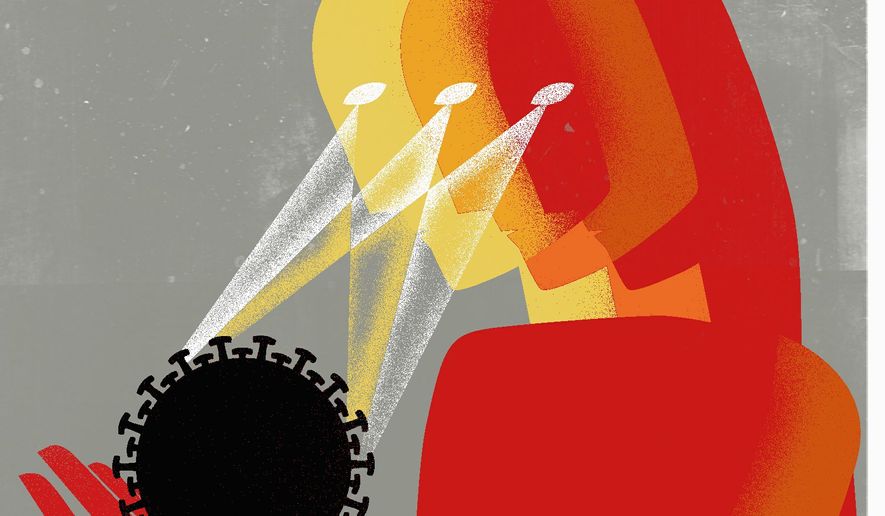OPINION:
Last week, I received a letter from the ambassador of a free and friendly country. It began:
Dear Mr. May,
It is no exaggeration to say that in the span of about eight weeks, the focus and priorities of every country in the world have been upended by the unprecedented outbreak of COVID-19.
Here’s the response I wrote but haven’t sent:
Dear Mr. Ambassador,
Actually, that is an exaggeration. Countries ruled by regimes hostile to democratic societies such as yours and mine have kept their focus and priorities firmly in place.
Despite the pandemic, their conduct has been as belligerent and oppressive as ever. In fact, with much of the world distracted by the intertwined health and economic crises, some have grown bolder.
Start with China’s rulers. They’ve cracked down on Hong Kong, re-arresting more than a dozen prominent pro-democracy activists, including Jimmy Lai and Martin Lee. They’re violating “one country, two systems,” the promise they made in exchange for which Britain handed the territory over to Communist control in 1997. They’re demanding Hong Kong legislators pass laws criminalizing dissent.
In normal times, such actions would almost certainly have sparked mass demonstrations. However, given the danger of further spreading COVID-19 – a virus that originated under the noses of China’s rulers — protesters have refrained from taking to the streets. That has helped mute media attention and international outrage.
“Hong Kongers can’t fight alone,” democracy activist Catrina Po told Canada’s National Post. “We don’t stand a chance against Beijing when we’re fighting alone.”
Next, let’s look in on the Islamic Republic of Iran, whose rulers are asking for funds they claim they’ll spend to fight the pandemic, as well as to revitalize an economy they’ve debilitated through mismanagement and corruption.
Meanwhile, they continue to spend on a uranium enrichment program that David Albright, president of the Institute for Science and International Security, this week called “in equal measure uneconomic, unnecessary for Iran’s civilian nuclear program, and unusually threatening to regional and international security.”
Nor are the gunboats of the Islamic Revolutionary Guard Corps staying in port. This month they harassed U.S. Navy vessels in international waters. Also, and in violation of international agreements, Iran’s rulers last week launched a military satellite that, they proudly acknowledged, will wage “intelligence warfare” against the United States.
Peter Pry, a former CIA officer and congressional advisor, noted that the trajectory of the missile should raise alarms. Nuclear-armed and utilized for EMP (electromagnetic pulse) attacks, such missiles could cause blackouts across the United States, killing millions and dealing America an economic blow from which it might never recover.
On to North Korea, which last month tested both short-range ballistic missiles and what state media called “super large” multiple rocket launchers.
“In a situation where the entire world is experiencing difficulties due to Covid-19, this kind of military act by North Korea is very inappropriate and we call for an immediate halt,” was the understated response from South Korea’s Joint Chiefs of Staff.
Of course, North Korean authorities claim “not a single person” in the country has been infected with the coronavirus, so perhaps they have no reason to change their focus and priorities. In any case, the big news out of North Korea is that dynastic dictator Kim Jong-un been missing in action since April 11. Rumor has it he’s under the weather.
Russia’s military, by contrast, is apparently in fine fiddle. High above the Mediterranean Sea this month, a Russian SU-35 fighter jet intercepted and buzzed a Navy reconnaissance aircraft. Russia also tested an anti-satellite missile, according to the U.S. Space Command.
Is Russia giving the United States a stress test? “Undoubtedly, they see a window of opportunity where the United States is really struggling with COVID-19,” said Bradley Bowman, senior director of FDD’s Center on Military and Political Power. “It’s an observable fact that it has had an impact on readiness.”
You should know, too, Mr. Ambassador, that non-state terrorists are not observing social distancing. In Mozambique this month, members of what authorities believe to be a franchise of the Islamic State killed more than 50 people, according to the BBC. Police said young men who turned down invitations to join the group were beheaded.
On to Kabul, where members of a different Islamic State branch attacked a Sikh temple, killing at least 25 worshippers. And in at least a dozen Afghan provinces, the Taliban struck both soldiers and civilians, ignoring a plea by U.N. Secretary-General António Guterres to “End the sickness of war and fight the disease that is ravaging our world.”
So, Mr. Ambassador, here’s the conclusion to which I think these developments lead: You, I, and other decent folks regard the pandemic as hugely significant — a matter of life and death.
But the world is a diverse place. Communists, revolutionary Islamists and other proponents of despotic ideologies consider life and death no big deal. After all, they kill people all the time — civilians and their own subjects very much included.
What they do see as imperative is staying focused on increasing their power at the expense of enemies whose morality and sentimentality they regard as weaknesses. Their goal is a new international order, one that will be illiberal, unfree, undemocratic and intolerant. Under the rules of this new world order, nations like yours and mine will submit — or suffer the consequences.
We find that hard to imagine. We wish it were not so. That may suggest we suffer from a lack of imagination and a surfeit of wishful thinking. In this increasingly sickened world, that’s increasingly dangerous. Stay healthy!
Sincerely,
Cliff
• Clifford D. May is founder and president of the Foundation for Defense of Democracies (FDD) and a columnist for The Washington Times.




Please read our comment policy before commenting.